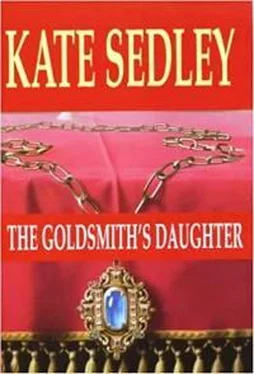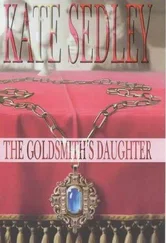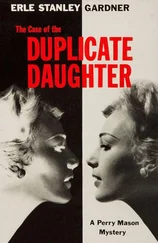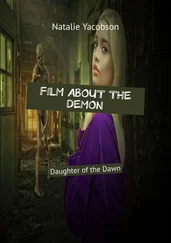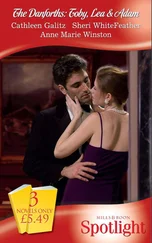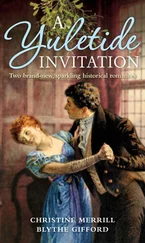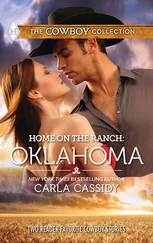Another man, not so very much older than the apprentice, was hammering out a piece of gold on an anvil, which stood on a bench in the middle of the room. As I watched, he laid down the hammer and picked up a pair of tweezers, beginning to pull and tease the hot metal into shape. Near at hand lay a chisel and a rabbit’s foot, while further along the bench were what looked like a pair of dividers, a saw, a file and a number of small earthenware dishes. An array of other tools was ranged along a shelf to my right.
It was the older man, whom I rightly guessed to be Miles Babcary, who saw me first, bustling forward in the hope of a sale, his face falling ludicrously as soon as he noted my homespun apparel.
‘Master Babcary?’ I asked, holding out my hand. ‘I’m Roger Chapman. Mistress Shore told you, I think, that I should be coming?’
I judged him to be about sixty (he later told me that he had not long celebrated his fifty-eighth birthday), a ruddy-cheeked, somewhat corpulent man with thinning grey hair in which gleams of chestnut brown could still be seen. His pale blue eyes, magnified by the spectacles perched on the bridge of his nose, blinked at me, owl-like, but at my words, his kindly features brightened.
‘So she did! So she did! Walk around the counter, Master Chapman. You are more than welcome. We shall be very glad, believe me, to have this hateful business cleared up once and for all. You can have no idea what it’s like for my daughter to be whispered about behind her back.’
‘Master Babcary,’ I warned, ‘I may not be able to arrive at any firm conclusion. Or …’ I hesitated. The elder of the two younger men had now drawn near and was listening intently to our conversation. I continued, ‘Or I might reach the wrong conclusion as far as you’re concerned.’ I saw from Miles Babcary’s slightly puzzled expression that he did not fully understand my meaning, and I began to flounder. ‘What I mean is … What I am trying to say …’
The young man came to my rescue. ‘Are you suggesting, Chapman, the possibility that my cousin Isolda might really have poisoned her husband?’
Both his age and a fleeting likeness to Miles told me that he must be the nephew, named by Mistress Shore, if my memory served me aright, as Christopher Babcary. I nodded, and there was an immediate explosion of protest from his uncle.
‘No, no! I won’t have it! My dearest girl could never have done anything so terrible! Master Chapman, you are here to prove her innocence.’
‘I will if I can, sir,’ I assured him. ‘But you must have realised by now that if Mistress Bonifant isn’t guilty, then someone else is.’
Again, I encountered that bewildered stare, and again it was Christopher Babcary who interpreted my meaning.
‘What the chapman is saying, Uncle, is that if Isolda didn’t murder Gideon, then someone else in the house must be the killer; one or the other of us who was present here that day, at Mistress Perle’s birthday celebration.’
This idea, although I could see that it was not a new one to the nephew, plainly had not occurred before to Master Babcary. So absorbed had he been in trying to prove that his daughter was not a murderess that the implication of her innocence had quite escaped him. For a moment he looked as if he might burst into tears, but then pulled himself together, his face taking on a mulish expression.
‘I–I want Isolda exonerated,’ he stuttered at last. ‘She didn’t do it. I know she didn’t. She loved Gideon, whatever he might have said to the contrary. I’m sorry, Christopher, my boy, if it means that you and others fall under suspicion. But if it’s of consolation to you, I don’t believe that anyone who was present here that day is guilty, either. In fact, I’m very sure no one is.’
Christopher Babcary glanced at me, then back at Miles. ‘But it stands to reason, Uncle, that one of us must have poisoned Gideon. Besides himself, there were nine of us in the house that evening, and apart from those nine, no one else could have put the monkshood in his drink. The shop was locked and shuttered as soon as the guests had arrived.’
Miles Babcary put a hand to his forehead, growing more confused by the minute. One half of his mind could not help but acknowledge his nephew’s logic, but the other half refused to accept it. If Miles could have his way, Gideon Bonifant’s murder would prove to have been an accident or suicide; or, better still, the handiwork of a passing stranger who had mysteriously managed to gain access to the house.
I said gently, ‘Master Babcary, we cannot continue to stand here in the shop where every passing fool can gape at us through the open doorway. Can we be private? In spite of talking to Mistress Shore, I am still ignorant of many details concerning this murder.’
‘Yes, yes! Of course! But you must wait a few moments, if you please. Toby, is the gold melted yet? If so, bring it over here immediately.’
The boy lifted a pot out of the furnace with a pair of tongs and carefully transported it to the work bench, his tongue protruding from one corner of his mouth, his young body taut with concentration as he tried not to spill any of the precious liquid. Meantime, Miles Babcary had drawn towards him a thin sheet of copper on which innumerable circles were shallowly engraved; and within each circle a bird or a flower, the figure of a saint, a face or the wheel of fortune was also scored into the metal. It was plainly a mould of some sort, but what purpose was served by the final product – delicate, paper-thin, filigree golden medallions – I could not imagine.
Christopher Babcary, noting my puzzled frown, enlightened me.
‘They are sewn on women’s gowns. They make the material shimmer as my lady walks.’
‘So that’s what it was,’ I said. ‘I’m remembering how Mistress Shore’s robe glittered at the Duke of York’s wedding.’
‘As did every other lady’s gown, I should imagine,’ Christopher amended. ‘We and the rest of the goldsmiths hereabouts sold out of our entire stock of medallions during the preceding weeks.’
His uncle, meanwhile, had been filling the circular moulds with the molten gold, the surplus being caught in a narrow runnel fixed to the edge of the bench. The boy addressed as Toby began to scrape at the lumps and flakes as they hardened, gathering them up and carefully depositing them in some of the earthenware bowls.
‘Where does the gold come from?’ I asked.
‘Mostly from Hungary and Bohemia,’ Miles Babcary answered, removing his leather apron and hanging it up on a nail. ‘These days, it’s brought into the country in the shape of coins, which are thought preferable to the old-fashioned ingots … Well now, Master Chapman, perhaps you’d like to accompany me upstairs where we can be comfortable, and I’ll tell you all you need to know about this unfortunate affair.’
He paused long enough to issue instructions to his nephew and the boy, Toby, on what needed to be done during his absence, then led the way through an inner door to a passageway beyond. Here, to our right, a staircase spiralled upwards, while, straight ahead, lay what I supposed to be the kitchen quarters. As if to prove my assumption correct, a young girl appeared, entering from the yard at the back and carrying across her shoulders a yoke from which two buckets were suspended, some of their contents spilling on to the flags in great splashes of clear, sweet water.
‘Ah! Meg!’ Miles Babcary beckoned her forward. ‘This is Roger Chapman who will be in and out of the house and shop for a while. He may want to ask you some questions, but there’s no cause to be afraid of him. Just tell him what you know. He won’t get angry or hurt you.’
The girl unhitched the yoke from her shoulders, lowering it and the buckets to the ground before approaching us with such caution that she literally inched her way along the wall, arms outstretched, fingers splayed against the stone.
Читать дальше
